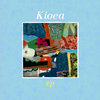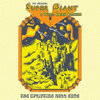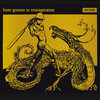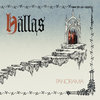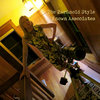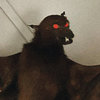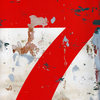Brother (1970) by Third Eye South Africa
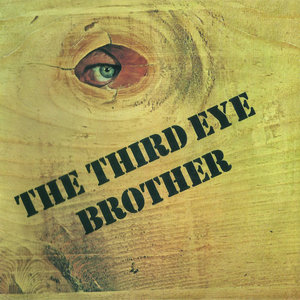
Third Eye coalesced in Durban in 1968 around the young brother and sister team of Ron and Dawn Selby. The two – with Ron on guitar and Dawn, just into her teens, on Hammond organ – had played alongside bassist Mike Sauer in a Durban band It’s a Secret. Formed in 1963, It’s a Secret had played mainly commercial cover music, but the times they were a-changing’. The arrival of Maurice Saul, a guitarist who had worked the boards in what was then Rhodesia (later Zimbabwe) before travelling the well-worn path south, and Robbie Pavid, a drummer who doubled as the percussionist for Abstract Truth, another Durban-based progressive outfit, saw the band morph into Third Eye.
Mixing original compositions with favourites from the overseas scene – such as Deep Purple and Hendrix – Third Eye gigged around Durban and the neighbouring city of Pietermaritzburg, with Robbie playing the cocktail set with Abstract Truth between 5pm and 7pm before taking up the sticks with Third Eye. At the start the band played ‘sessions’, with Third Eye blitzing a single venue alongside such groups as The Flames, The In Crowd and The Bats. As they grew in popularity, so did the number of gigs they played. ‘Battles of the Bands’, peculiarly South African musical contests that saw bands competing against each other at mini-festivals, were fought and full-blown festivals trawled. Soon Third Eye found themselves playing to bigger, more appreciative audiences and having the freedom to perform their own compositions. The scene was blossoming, on the verge of a massive creative flowering – and the record executives were sensing an opportunity.
In 1968 the song Fire had been recorded by the band on four-track at Troubadour Studios in Johannesburg under producer Billy Forrest, and it was the strength of this single that led to a more significant recording contract. Third Eye were snapped up by Trutone, on the Polydor label, one of the premier labels at the time, which signed them for three albums. It heralded a hectic couple of years, with Awakening released in 1969 followed by two releases in a single year in 1970 – Searching and Brother. Amazingly the three albums were recorded in just six days. “I think there was real purpose behind what was being written in those days – before the general commercialisation of music in South Africa,” says Dawn. “We didn’t have things like auto-tune for our voices, or the possibilities of overdubbing. All three albums were recorded over three two-day periods (which had to be over the weekends so that the guys could take time off work and I didn’t miss out on school). As a result we didn’t have the opportunity of re-taking many songs as there wasn’t enough time. We also recorded on eight track, so it was a case of one, two, three go – and see you at the end! Only the voices and some brass work were overdubbed.”
They were heady days – both musically and politically. Awakening had been dedicated by Maurice Saul, driven by a “personal disgust with war and hatred”, to all “young men in this world forced to go to war”. It could have been directed nearer to home, where boys were being conscripted into the army and the white society was becoming deeply polarised. The increasingly authoritarian government clearly saw rock musicians as a threat, playing “devil’s music” to the gullible young. No one could escape the looming crackdown. And it all came to a head in October 1970 at the Milner Park 24 hour rock festival near Johannesburg, with Third Eye as top of the bill alongside a host of other big names – including The Flames, Otis Waygood, Freedoms Children, Abstract Truth and Suck. As the good-natured crowd gathered, they were stormed by conservative youths – divinity students from a nearby university, say some, while newspaper reports claim they were from a local police college – who dragged some of the audience away to cut their hair.
“We were there for the music,” remembers Dawn. ”I saw the Hell’s Angels (who were there for security) arrive, which was pretty scary, but I’m sure the violence had nothing to do with them. These festivals were about peace and anti-war, but I suppose there were some people present who opposed change and the ‘long-haired hippies’. This was the year after Woodstock and I think all us musos were trying to make peace statements. One of the cover songs in our repertoire was Morning Dew (also recorded on the album Awakening). If you look at the lyrics it’s all about global warming and how nothing was being done about it. What’s changed? The band never discussed the problems of the world – we just said it all through our lyrics and the music.”
The festival proved to be a symbolic turning point, mirroring in a South African microcosm the era-ending events of Altmont that had taken place just a few months earlier. With the writing on the wall, musicians were leaving South Africa in ever-larger numbers in search of more commercially and politically friendly climes. Third Eye considered a move abroad but their tentative plans came to nought. But staying at home was not the easy option. Musical styles within the country were shifting, disco was rearing its ugly head and work was becoming increasingly scarce for those bands playing original material. The problems were compounded by an influx from abroad of jobbing musicians – mainly British and Irish – who were being allowed in even though South Africans were barred from playing in other countries – especially Britain. Without a strong musicians’ union the interlopers were taking many of the limited gigs available, pushing local musicians to the periphery.
Trutone were not renewing the contract and there were no royalties coming from the three albums already recorded. “With no support from our record company in terms of publicity or marketing (despite having signed a very binding contract which still stands today) it was impossible for us to continue,” says Dawn. “If we wanted to play, and earn something back for what we had put in, we had to go commercial and do the gig band thing. It became a ‘chicken and egg‘ situation. To create the music, we needed to spend time with the band. But as the band was not earning any income we had to work in the day (I started teaching when I was 14) to support ourselves. But this limited our time for rehearsing or travelling to the better gigs.”
Maurice and Robbie called it a day. Ron, Dawn and Mike continued to carry the flag for Third Eye, although Mike eventually quit a year later. In 1973 Third Eye, with only Ron and Dawn as surviving members of the original line-up, returned to RPM Studios in Johannesburg to record some tracks for an album. Two of these songs – Caterpillar b/w What’s Going On – were released by Bluejeans Records in the Benelux countries and one – Free – made its way on to an EMI compilation album in 1998. Needless to say, no royalties have been forthcoming.
Tracklist
| 1. | 01 Brother | 4:00 |
| 2. | Once Upon A Time (Part 1) | 3:46 |
| 3. | Once Upon A Time (Part 2) | 4:00 |
| 4. | Listen To The Bells | 5:40 |
| 5. | Sister | 4:02 |
| 6. | Young Folk And Old Folk | 3:30 |
| 7. | Fire_ a) Prelude b) Poem c) Fire | 7:55 |
Credits
(P) and (C) 1970 The Gallo Record Company Vault
License
All rights reserved.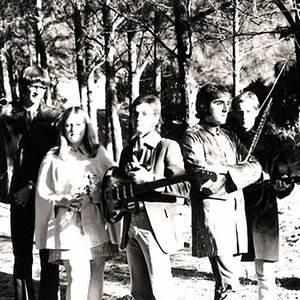
Third Eye was formed in Durban in 1968 around the young brother and sister team of Ron and Dawn Selby. The two – with Ron on guitar and Dawn, just into her teens, on Hammond organ. The arrival of guitarist Maurice Saul, from the then Rhodesia, and Robbie Pavid, a drummer who doubled as the percussionist for Abstract Truth, another Durban-based progressive outfit, saw the band morph into Third Eye.
